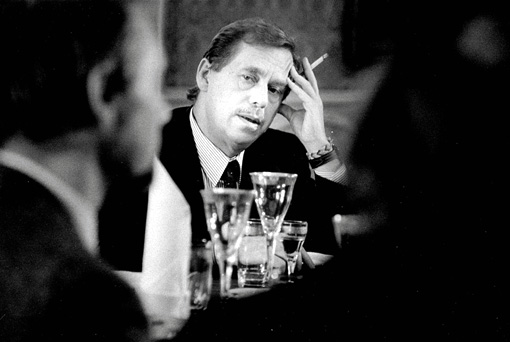Typograms & Ptydepe: Remembering Vaclav Havel

As you've heard by now, playwright, poet, dissident, and former Czech president Vaclav Havel died this weekend at the age of 75. The New Yorker's David Remnick recommends some of Havel's favorite writers, including poets Joseph Brodksy and Czeslaw Milosz; and The New York Times excerpts reviews of plays written by Havel, many of which premiered in New York's Public Theater.
Havel himself had recently lost a friend in Czech poet Ivan Martin Jirous, who died in November. Havel wrote poems too of course, including his famous visual poems (typograms) from the early and mid-1960s. Another beautiful one here.
Another great way to invest time in Havel's creative work would be to take a listen to the radio play The Memorandum (1966), which is up at UbuWeb. A bit about it:
Source: tape recording of broadcast material.
Satirical Comedy.
The Memorandum (VyrozumenÌ) written 1966, is one of the best known and most popular plays by Czechoslovaki's (later the Czech Republic's) best known playwright, Vaclav Havel.
Inspired by the absurdities of life in Eastern Europe under Communism,like much of Havel's writing, The Memorandum is political, at least implicitly. The play concerns the tribulations of Josef Gross, the managing director of an organization encumbered by a bureaucracy that is out of control. The introduction of an artificial language, Ptydepe, is supposed to streamline office communications, but only makes it worse.
Havel's satire is full of irony about the kind of jobs created by communism as well as the constant surveillance by office spies. Though Havel's vision was informed by his observations many critics have noted that the office politics depicted can be found around the world. The importance of conformity to keep one's job is seen as relatively common.
As Michael Billington of The Guardian wrote,"The play may have grown out of experience of Czech communism; its application, however, is universal."
The Memorandum opens in the office of Josef Gross, the managing director of an office. He is reading his mail when he comes across an important memorandum written in what seems like an incomprehensible language. His secretary, Hana, informs him that it is written in Ptydepe, a new language that is supposed to be more efficient for communication. Gross learns that his deputy director, Jan Ballas, has ordered its introduction without his knowledge. Gross asks him to cancel its introduction, and while Ballas agrees at first, he later convinces Gross that the use of Ptydepe would be best for everyone. This is endemic of the growing power struggle between Gross and Ballas. While Gross wants to work on a humanist principle, Ballas is ready for a conflict and believes he has everyone in the organization on his side. What follows is ludicrously comic..........
As for Ptydepe, Havel's orginial artificial language, you can read all about it here. Interestingly: "The vocabulary of Ptydepe uses entropy encoding: shorter words have more common meanings. Therefore, the shortest word in Ptydepe, gh, corresponds to what is so far known to be the most general term in natural language, whatever. (The longest word in Ptydepe, which contains 319 letters, is the word for 'wombat'.) Theoretically an even shorter word than gh exists in Ptydepe, namely f, but it has no meaning assigned and is held in reserve in case a more general term than 'whatever' is discovered."
Ubu's also got an essay about Czech concrete poetry and experimentation by Mary Ellen Solt, which puts Havel's poetic work in context with the likes of Jirous, Jiri Kolar, and Haroldo de Campos.


